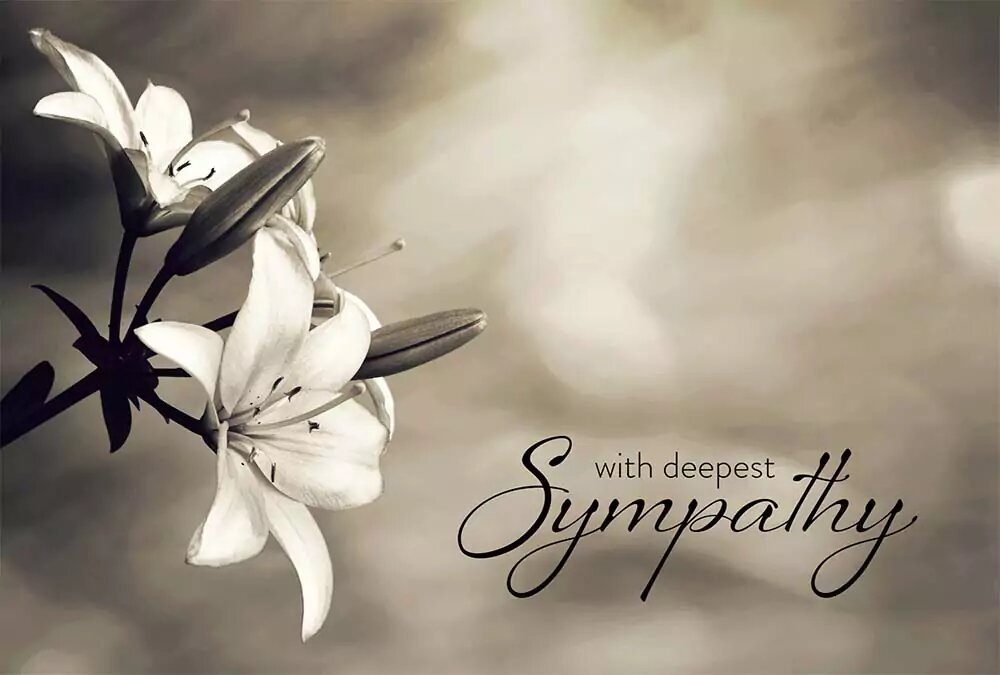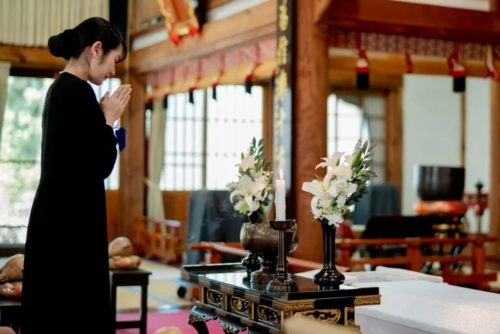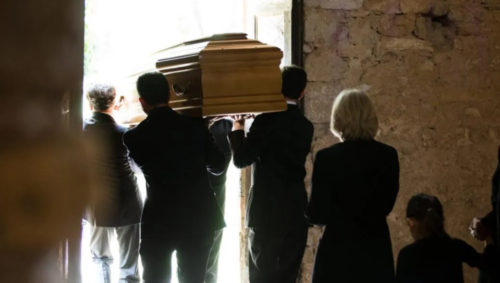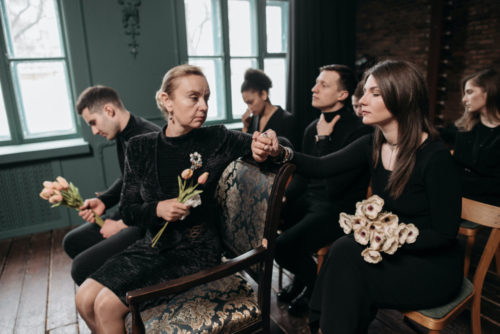Resources
The loss of a loved one is one of the most difficult situations to face in life. This can be especially trying if you are in charge of making the funeral arrangements. Our family here at FuneralHomes.com would like to share with your family some points from experienced funeral directors that will help you in such a troubling time.

Condolence Messages for the Loss of a Grandfather
- May 25, 2022
- Celebrations of Life
Losing your grandfather can be very challenging and hard to deal with. If you know someone that has lost their grandfather, it’s a good idea to try and assist them, offer them support and a way to get past their struggles. Sending condolence messages is actually very appropriate and helpful, and it has the potential to really make a difference.
Sending tons of love your way
We always need to try and help those who lose their grandfather. That’s why a message like this where you are sending tons of love to the person who lost their loved one can really help. You should try to keep it simple, and also offer your support as needed. Stuff like this is what really matters the most and you must tackle it the best way that you can. Doing so will eliminate concerns and it will also offer much better results in the long term.
He was a force of nature
“Your grandfather was a force of nature, he inspired us and always did amazing things in life. I wish you to be even more like him and continue his amazing legacy.” This is the type of condolence message that gives you inspiration for the future. It really helps push the limits and show that everything is indeed possible if you stick to it. Of course there are demanding situations that can arise, but your words can help..

Condolence Messages for the Loss of a Grandmother
- May 24, 2022
- Celebrations of Life
Losing your grandmother is a very challenging time and that’s when you need as much support and assistance as you can get. The truth is that there will always be challenges that arise in a situation like this, so receiving some condolence messages is exactly what you need. If you have someone in your life that lost their grandmother, then it’s a very good idea to share some condolences. It helps, and it really makes a difference in their life too, which is exactly what you need to focus on.
She was a gift from heaven
“Your grandmother was a gift from heaven, but remember that you will get back to her eventually, it’s important to regroup and focus on making her proud until you get back to her.” This is a great idea because it’s one of those messages that can be powerful, very efficient and creative, but also filled with important messages that will make it easier for your friend or loved one to regroup and re-adjust their life now that they are dealing with this type of struggle. It’s definitely a huge challenge, but one that’s certainly going to get even more challenging in the long term.
So sorry for your loss
“I am very sorry for your loss, I know how much you loved your grandmother, so dealing with this loss can be very difficult. I am here to offer you all the support and help you need.” This is the type of message that will help someone get past their grievance and just focus on the situation at hand. Of course it’s challenging and very hard for anyone to lose a person in their life. But these things happen and there’s not a whole lot you can do. Which is why offering your support and assistance can be a great idea, and it will eliminate a lot of the worries and concerns in the long run.

Condolence Messages for The Loss of a Brother
- May 18, 2022
- Celebrations of Life
Losing a brother is very challenging and one of the most difficult things that you can deal with. That’s why it can be very important to send some condolence messages to someone that has lost a brother. This is a very challenging situation that obviously no one wants to deal with. But in the end, the reality is that having a condolence message like that get you past harsh times. It all comes down to making sure that you find a way to send the right condolence messages and share them with the right person.
Simple, yet efficient condolence message
“I just heard the news about X, I am very sorry for your loss. Remember that I am here for you, no matter what happens.” This is the type of message that will actually make it easy to show your support, while eliminating any concerns that might arise. The reality is that you don’t have to go with complex condolence messages, simple stuff is the most efficient and it will show that you actually care, which is what matters the most.
Heartfelt message
“I am very sad to hear that your brother just passed. He was an amazing person and I will always remember him for his commitment and happiness. I am here to help, so if you need anything don’t hesitate to get in touch.” Using this type of heartfelt message is always going to help you show your support. It’s what really matters, after all.

6 Death Rituals From Around the World
- May 6, 2022
- Celebrations of Life
Losing a loved one is without a doubt one of the most heart-rending events any of us can go through. Sadly, death is an inescapable reality that everyone is confronted with at some point in life. Although, we inevitably will experience the death of loved ones at some point in our lives, whether we choose to focus on mourning their passing, or celebrating the beauty of the life they led is up to us.
Typically funerals are somber affairs as loved ones and guests of the deceased honor them through a mournful ceremony and sets of customs. However, some cultures take a different approach, focusing on paying tribute to the deceased in a more celebratory fashion.
In this post, we will take a closer look at the funerary customs of 6 different cultures. We will explore the way in which these cultures remember and respect the dead, including the various prayers and rituals performed in the deceased’s honor.

How to Donate a Body to Science After Death
- April 8, 2022
- Celebrations of Life
If you wish to donate your body to science, now it is possible after you have passed away. However, first consult the anatomical institute of one of the universities or hospitals to consider the procedures, as this is different from organ or tissue donor registration. However, if you are already a registered organ or tissue donor, it plays a significant role in body donation.
You need to request permission from an anatomical institution for body donation to science and medical research. They need a handwritten statement saying that you desire your body to be given to medical science after your death. For the institute record, you must also sign and date the declaration.
Acceptance criteria for Body Donation
Many individuals, such as those with cancer, heart disease, arthritis, diabetes, and other chronic conditions, fulfil the requirement for donation. The final acceptance criteria depend on conditions like HIV/AIDS, Hepatitis B or C, COVID-19 (symptoms, exposure, or diagnosis), unusually high or low body mass index (BMI), permission challenges, location of residence or passing, legal matters, condition of the body at the time of passing, or any failure to place the donation with current medical research or educational projects at the time of passing.

A Guide to Funeral Processions
- March 28, 2022
- Customs
Funeral processions are very important and a crucial part of the funeral service. They are designed to bring comfort to the friends and family of a person that just passed away. Knowing the funeral procession etiquette and understanding religious funeral customs is very important and it can make a huge difference. You have to ensure that you understand how these things work and how you can follow the right guidelines and be certain that everything is done to the letter.
Understanding what a funeral procession is
The funeral procession is the family and friends of a person that passed away following their coffin as they are taken to their resting place. It’s also known as a funeral cortege. This procession starts at the funeral home, or at the home of the person, and it follows the coffin to the burial place. Sometimes the funeral procession goes to the funeral service location or the committal, it depends on the situation at hand.
What you will notice is that most of the time you will have a funeral director. He is the one that leads the cortege on foot for a small distance, at least before it gets into the hearse. With that in mind, once they reach the crematorium, cemetery, or the place of worship, they will lead the cortege on foot again, which is extremely important.

Guide to Attending a Funeral During a Family Feud
- March 28, 2022
- Celebrations of Life
Family conflicts happen, and they can end up diminishing the relationships that people have with one another. However, when you are in the middle of a family conflict and one of the family members dies, that ends up becoming a huge challenge. It’s certainly not something easy to do, and you have to ensure you adapt and implement everything properly. That doesn’t mean it will be easy to do, but in the end what matters is keeping your family together and dealing with any family feuds the best way that you can.
In fact, it’s a good idea to ensure that you and the ones you have a feud with put it aside and focus on making the funeral a celebration of life, rather than a place to air your grievances. On top of that, you want to ensure that you study religious funeral customs and see exactly what you need to follow and stick to those guidelines. You may even find a lot of customs that you never knew existed, which is quite common in a situation like this. Adapting and implementing accordingly is always going to be a bit of a challenge, but that’s what makes things work in the end.
Compromise is key
Having a way to compromise is crucial here since it shows that nothing is more important than the funeral. A good idea is to try and squash any of the beef on the phone or a video call before you meet at the funeral. Doing that is crucial, because no one wants to see people fighting during a funeral. It’s not appropriate and it’s also a sign of disrespect for the person that passed away.

How to Find a Will After Someone Dies
- March 15, 2022
- Planning
Many times when someone close to us dies, we might not have full disclosure as to whether or not they had prepared a will prior to their passing. Other times, the family of the deceased is well aware there is a will, but simply has no access to a copy. Traditionally, most people have an attorney write and keep their will, or choose to file it in a probate court. However, there are many cases in which the deceased may choose to write and keep the will themselves prior to their passing by filling out an online form. Regardless of your situation and how your loved one’s will has been filed or stored, continue reading to find out how you can find a will after someone has died.
How Can You Find Out If There Was Even a Will?
When trying to find out if someone left will, the answer might be more obvious or transparent than you think. Nonetheless, in many cases finding out if someone left a will can take time and effort, including getting help from a professional.
Options to consider when trying to find out if someone left a will:
1) Contact close family members or relatives
It’s not unusual for people to leave their will in the hands of someone in the family or close friend who can properly protect and store it until their passing. Make it a priority to ask those related to the deceased with an understanding of legal protocols. Most people prefer referring to those in the field whom they are closely connected to over hiring someone outside of the family or their friend’s group.

What is a Legal Pronouncement of Death and How Do You Obtain One?
- March 15, 2022
- Planning
Saying goodbye is never easy. Letting go of someone you love and acknowledging their passing are by far some of the most heart-rending experiences you can encounter. As you are grieving your loved one, it can be challenging to find the mental and emotional strength to determine the next steps to take after a loved one dies.
After a loved one’s passing, it is necessary to obtain a legal pronouncement of their death. In today’s post, we will be taking a closer look at what a pronouncement of death entails and its value, and offer guidance on how you can obtain one.
What Is a Pronouncement of Death?
Since the beginning of time, family members of the deceased would usually count on either a religious leader, doctor, law official, or nurse to legally and officially pronounce whether he or she has died or not. This is one of the few shared experiences that universally applies to most cultures and religions after someone’s life comes to an end. Serving as an official representation to announce that someone has passed, a pronouncement of death holds significant meaning to the bereaved family.

How Soon Should You Start Dating After the Loss of a Significant Other?
- February 24, 2022
- Celebrations of Life
It’s normal and usually expected to feel lonely and long for companionship after the loss of a significant other. For many, their spouse is their best friend, caregiver, lover, companion, and hand of support during difficult times. Desiring love and a life with a partner to share the next chapter of your life is by no means selfish or wrong. And when it comes to determining the proper time and length to start dating again after the loss of your significant other, only you will have the correct answer.
As you heal from your grieving process and begin to consider the idea of dating again, keep in mind that no two people grieve the same and everyone’s journey is individual with its own ups and downs. Regardless of what we cover in this post or what someone demands from you, at the end of the day, whether or not you’re ready to find another partner will always depend on your own convictions. If you take anything from this post, please know there isn’t a wrong or right answer when it refers to dating after the loss of a significant other.
Losing a Significant Other
First and foremost, losing a significant other is without a doubt one of the most difficult goodbyes anyone can experience. Nothing can fully prepare us for the reality of losing the person we once promised to share our lives with. As we consider the heart-rending nature of this inevitable part of life, it’s also important to mention that eventually moving on after a significant other’s loss is appropriate and is what our loved ones would’ve wanted for us. They would want us to find new love and be happy once again.
